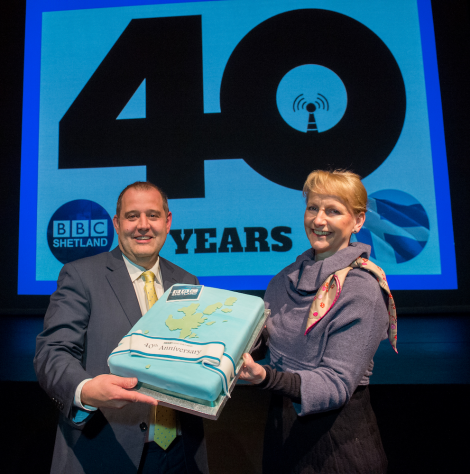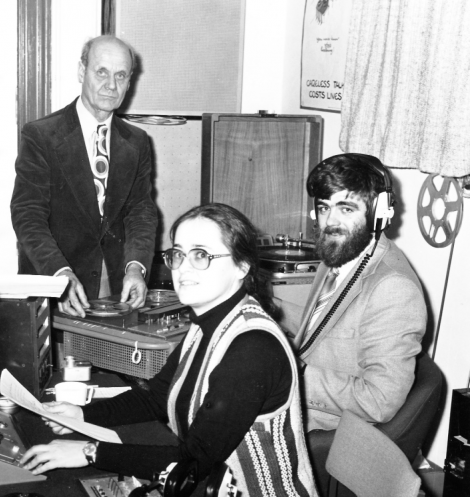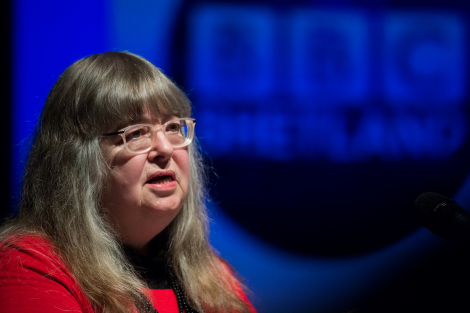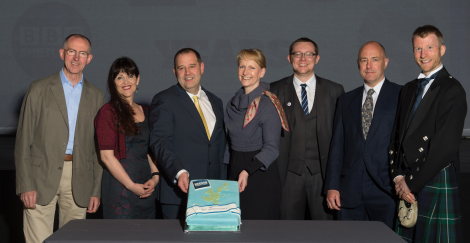Features / Radio Shetland: 40 years of team spirit
BBC RADIO Shetland is this week celebrating 40 years of being on air and serving the local community with news, features and music.
The station, which began life with just two members of staff back in May 1977, has seen it all over the last four decades, from the the Braer disaster in January 1993 to fatal air crashes and a stream of political campaigns.
It was first staffed by local journalist Jonathan Wills and BBC television producer Suzanne Gibbs, who lived in England but had already worked in Shetland on a wildlife documentary.
Both underwent radio training before touring the isles’ halls to get the public’s views on what the station should offer.
The duo got to work in an office and studio on Lerwick’s Harbour Street and, while a secretary was later employed, there were few moments of rest.
“We had no staff at all with us to begin with, so we had to hoover through the office before we actually started working,” Gibbs said.
“The two of us were quite well put together, as he could do the hard news and I could do the soft news.
“We started the same day as Radio Orkney, and we had meetings before we started. We all sat down virtually with an envelope and wrote down a menu of what the programme should be.”
She believes what is still happening is almost “exactly as we wrote down on the envelopes, which is quite amazing after 40 years”.
Razor blades and sellotape
The equipment was primitive compared to the dominance of all things digital today. “We had little razor blades and we would cut out all the ums and ahhs and all the things we didn’t want, and used a little machine that stuck it together with sellotape,” Gibbs reflected.
Become a member of Shetland News
Wills said the original equipment consisted of a Telefunken M28 tape deck, two Uher portable tape machines, a single turntable, two microphones and a “decidedly dodgy cassette player”.
“There was no ‘mixer’ and the control desk was a one-off, designed to be idiot-proof,” he added.
“It caused problems and, as we went live on air for the first time, an engineer was squatting between my knees, making last minute adjustments to the wiring.”
Wills said wildlife expert Bobby Tulloch contributed greatly to the station’s early days, providing content for features as well as live music.
There was also the Radio Shetland Christmas Pantomime Bobbyrella, featuring Tulloch in the role as Cinderella. Wills was Prince Charming while Gibbs and author Rhoda Bulter were the ugly sisters.
Gibbs recalled the station being the subject of satirical taunts from the Lerwick Up Helly Aa committee, while she also had listeners phoning in to tell her she was pronouncing words wrong in her English accent.
But it was the community that made everything worthwhile. “It was the people, definitely, that was the most rewarding part. Getting to know people and to find that they were so loyal and pleasant to me, as a complete novice to Shetland.”
Wills left the station after four years when a new council chief executive complained to the BBC that Radio Shetland under his management had “overstepped the mark, and then some”.
Gibbs only planned to be in her role for around two years, but she remained for another six years or so in light of Wills’ departure before returning to the mainland.
“What I’m proudest of is the contribution Radio Shetland has made to Shetland music and dialect,” Wills said.
“It’s hard to believe now but in 1977 there was really very little interest in traditional fiddle music and many locals actually objected when folk broadcast in the dialect instead of knappin’.”
Former lord lieutenant John Scott, meanwhile, was part of an advisory committee set up to oversee the launch of the station and to guide it through its early years.
It featured around six people who all shared an interest in seeing a radio station form in the isles and it lasted for around ten years.
“It was quite a pioneering thing to do at the time,” Scott said. “The BBC policy was that it had to be done not in dialect as it were, except for the weather forecast. Mary Blance did that, and that’s how she got the nickname Weather Mary.”
In 1998, the station moved from an overcrowding office in Brentham House to purpose built new premises at Pitt Lane.
Bringing dialect to the airwaves
It has looked after a host of talented staff, including Mary Blance and John Robertson, and local boys Jonathan Sutherland and Phil Goodlad got their break before moving south to land prominent roles with BBC Scotland.
Blance, who still contributes freelance work to the station, joined Radio Shetland in 1978 as its first full-time secretary.
She rose through the ranks, eventually becoming the head of the station, before leaving in 2000.
Blance became known for bringing Shetland dialect to the airwaves, first on the weather updates, but it was a surprisingly contentious move.
“For a lot of folk in the 1970s, it still wasn’t polite to speak dialect in public,” she said.
“A lot of Shetlanders were embarrassed by me, although there was a lot folk who had moved into Shetland who quite enjoyed hearing the dialect and appreciated it.
“It was awful weather, it was a really bad spring and a hard lambing, so a lot of folk just hated me because I represented that.”
Blance said the Braer coverage was one of her most vivid memories, with journalists from south using the premises as they camped out in Shetland.
“The press came from all around the world, and they needed our facilities. But we still had to get on air too,” she said.
“That was an astonishing time, having to deal with that. Somebody was working at Radio Shetland every hour of the day and the night.”
Despite Blance’s full-time involvement with the station ending nearly two decades ago, her affiliation with the radio remains strong today. “When I speak about Radio Shetland, I still say ‘we’,” she smiled.
The best job in Shetland
Robertson was part of the team between 1987 and 1993 as he cut his teeth in local journalism before working at The Shetland Times.
“My very first interview when senior producer John Fergusson gave me my chance back in 1987 was done in the pantry of a school canteen,” he recalled.
“I was alone in there with an extra-large Guizer Jarl who was down to his underpants after a head-and-beard shaving for charity. It was terrifying on several levels and very nearly put me off.
“There were many highlights but, for some reason, one that stands out was the Friday evening visits of fiddler Henry Henderson to present his Give Us A Tune.
“He was great company and always brought a bottle or two of his traditional Unst home brew for the weary team, which he carefully dispensed into plastic cups. It had a very pleasant and peculiar effect like no other alcohol I’ve had before or since.”
Robertson said the Radio Shetland team had a rapport that he’s never quite seen since.
“Looking back, it was a wonderful place to work and with a close-knit team spirit I’ve not experienced in a workplace since. I actually used to think I had the best job in Shetland.”
The station has also enjoyed the talents of a number of contributors over the last four decades, from Allan Anderson, Hank Smith and Charlie ‘Chasjazz’ Johnson to more recent freelancers such as Davie Gardner, Gussie Angus and Cecil Hughson.
Heading the team at the moment is John Johnston, who was first sent to Shetland to cover the Braer disaster for three months and has stayed in the isles ever since.
He oversaw the digital revolution reinvigorate the studio in the late 1990s – a far cry from when TV clips made for BBC Scotland had to sent on the plane south.
“I was the only one who didn’t smoke when I started,” he reflected. “When you came into the office, they would be smoking and there was a big reek of coffee.”
Johnston cites the black fish scandal of 2012 and the community battle to stop Sakchai Makao being extradited from the UK among the main stories he has covered.
“I get up every morning and really enjoy what I do,” he added. “We just try to reflect what is happening across Shetland through all the rich variety of programmes.
“One of the things I’m most proud of is Children In Need. In the whole time of Radio Shetland, over £1 million has been raised by the community.”
One of the station’s newest recruits is Daniel Lawson, who joined up in 2013 and learned the ropes straight from university.
“It’s a great job to have. There’s something different every day, and the chance to meet and speak to folk from all over the place,” he said.
“To work at Radio Shetland you have to be able to do a bit of everything – reporting, interviewing, presenting, editing – so it’s an excellent way to learn the ropes of journalism and broadcasting.
“It’s an interesting way to earn a living, and if you can help your community at the same time – inform, educate and entertain them – then that’s all to the good.”
So after 40 years, what’s the future for community radio in Shetland? BBC Scotland director Donalda MacKinnon was very clear in her message to Monday night’s birthday party, held at Mareel.
“My starting premise would be: ‘here is to the next 40 years, and hopefully beyond that”,” she said.
“Radio Shetland has proven over the last 40 years how much of a lifeline to this community it is, how much of a great service it has provided, and how much of a platform it has given the residents of Shetland.
“I am delighted that we have reached this very important milestone and the next steps are to continue that fantastic journey. There are unique stories that are being told here and should be shared beyond these shores.
“But fundamentally the most important thing that BBC Radio Shetland can do is to continue to serve the community here as well as it has done over these last 40 years.”
Become a member of Shetland News
Shetland News is asking its many readers to consider paying for membership to get additional features and services: -
- Remove non-local ads;
- Bookmark posts to read later;
- Exclusive curated weekly newsletter;
- Hide membership messages;
- Comments open for discussion.
If you appreciate what we do and feel strongly about impartial local journalism, then please become a member of Shetland News by either making a single payment, or setting up a monthly, quarterly or yearly subscription.































































